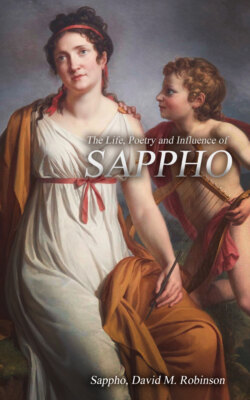The Life, Poetry and Influence of Sappho

Реклама. ООО «ЛитРес», ИНН: 7719571260.
Оглавление
Sappho. The Life, Poetry and Influence of Sappho
The Life, Poetry and Influence of Sappho
Table of Content
The Life of Sappho
Introduction
The Life of Sappho
The Writings of Sappho
The Complete Poems of Sappho
Introduction
I. Cyprus, Paphos, or Panormus
II. What shall we do, Cytherea?
III. Power and beauty and knowledge
IV. O Pan of the evergreen forest
V. O Aphrodite
VI. Peer of the gods he seems
VII. The Cyprian came to thy cradle
VIII. Aphrodite of the foam
IX. Nay, but always and forever
X. Let there be garlands, Dica
XI. When the Cretan maidens
XII. In a dream I spoke with the Cyprus-born
XIII. Sleep thou in the bosom
XIV. Hesperus, bringing together
XV. In the grey olive-grove a small brown bird
XVI. In the apple boughs the coolness
XVII. Pale rose leaves have fallen
XVIII. The courtyard of her house is wide
XIX. There is a medlar-tree
XX. I behold Arcturus going westward
XXI. Softly the first step of twilight
XXII. Once you lay upon my bosom
XXIII. I loved thee, Atthis, in the long ago
XXIV. I shall be ever maiden
XXV. It was summer when I found you
XXVI. I recall thy white gown, cinctured
XXVII. Lover, art thou of a surety
XXVIII. With your head thrown backward
XXIX. Ah, what am I but a torrent
XXX. Love shakes my soul, like a mountain wind
XXXI. Love, let the wind cry
XXXII. Heart of mine, if all the altars
XXXIII. Never yet, love, in earth's lifetime
XXXIV. "Who was Atthis?" men shall ask
XXXV. When the great pink mallow
XXXVI. When I pass thy door at night
XXXVII. Well I found you in the twilit garden
XXXVIII. Will not men remember us
XXXIX. I grow weary of the foreign cities
XL. Ah, what detains thee, Phaon
XLI. Phaon, O my lover
XLII. O heart of insatiable longing
XLIII. Surely somehow, in some measure
XLIV. O but my delicate lover
XLV. Softer than the hill-fog to the forest
XLVI. I seek and desire
XLVII. Like torn sea-kelp in the drift
XLVIII. Fine woven purple linen
XLIX. When I am home from travel
L. When I behold the pharos shine
LI. Is the day long
LII. Lo, on the distance a dark blue ravine
LIII. Art thou the top-most apple
LIV. How soon will all my lovely days be over
LV. Soul of sorrow, why this weeping?
LVI. It never can be mine
LVII. Others shall behold the sun
LVIII. Let thy strong spirit never fear
LIX. Will none say of Sappho
LX. When I have departed
LXI. There is no more to say now thou art still
LXII. Play up, play up thy silver flute
LXIII. A beautiful child is mine
LXIV. Ah, but now henceforth
LXV. Softly the wind moves through the radiant morning
LXVI. What the west wind whispers
LXVII. Indoors the fire is kindled
LXVIII. You ask how love can keep the mortal soul
LXIX. Like a tall forest were their spears
LXX. My lover smiled, "O friend, ask not
LXXI. Ye who have the stable world
LXXII. I heard the gods reply
LXXIII. The sun on the tide, the peach on the bough
LXXIV. If death be good
LXXV. Tell me what this life means
LXXVI. Ye have heard how Marsyas
LXXVII. Hour by hour I sit
LXXVIII. Once in the shining street
LXXIX. How strange is love, O my lover!
LXXX. How to say I love you
LXXXI. Hark, love, to the tambourines
LXXXII. Over the roofs the honey-coloured moon
LXXXIII. In the quiet garden world
LXXXIV. Soft was the wind in the beech-trees
LXXXV. Have you heard the news of Sappho's garden
LXXXVI. Love is so strong a thing
LXXXVII. Hadst thou, with all thy loveliness, been true
LXXXVIII. As, on a morn, a traveller might emerge
LXXXIX. Where shall I look for thee
XC. A sad, sad face, and saddest eyes that ever
XCI. Why have the gods in derision
XCII. Like a red lily in the meadow grasses
XCIII. When in the spring the swallows all return
XCIV. Cold is the wind where Daphne sleeps
XCV. Hark, where Poseidon's
XCVI. Hark, my lover, it is spring!
XCVII. When the early soft spring wind comes blowing
XCVIII. I am more tremulous than shaken reeds
XCIX. Over the wheat-field
C. Once more the rain on the mountain
EPILOGUE
The Influence and Legacy of Sappho
Sappho in Art
Sappho’s Influence on Greek and Roman Literature
Sappho in the Middle Ages and the Renaissance
Sappho in Italy in 18th and 19th Century
Sappho in Latin Translations, in Spanish, and in German
Sappho in French Literature168
Sappho in English and American Literature
Sappho’s Influence on Music
Epilogue and Conclusion
Отрывок из книги
Sappho, David M. Robinson
e-artnow, 2022
.....
Catullus21 speaks of the Sapphica Musa, and Ausonius in Epigram XXXII calls her Lesbia Pieriis Sappho soror addita Musis.22
If we turn now from the praise of the ancients to modern literary critics of classic lore we shall not find any depredation but rather an enhancing of that ancient praise. The classic estimate of Sappho holds its own and more than holds it to-day. J. A. K. Thomson in his Greeks and Barbarians23 says: “Landor is not Greek any more than Leconte de Lisle is Greek ... they have not the banked and inward-burning fire which makes Sappho so different.” Mackail speaks of “the feeling expressed in splendid but hardly exaggerated language by Swinburne, in that early poem where, alone among the moderns, he has mastered and all but reproduced one of her favourite metres, the Sapphic stanza which she invented and to which she gave her name”—
.....